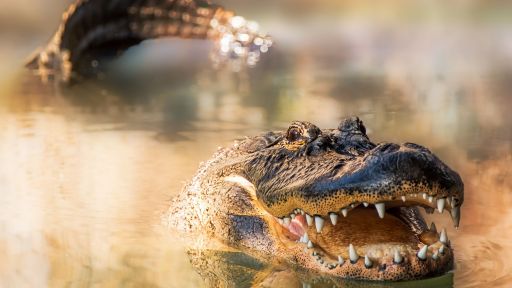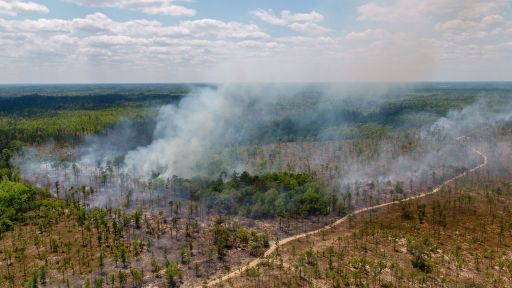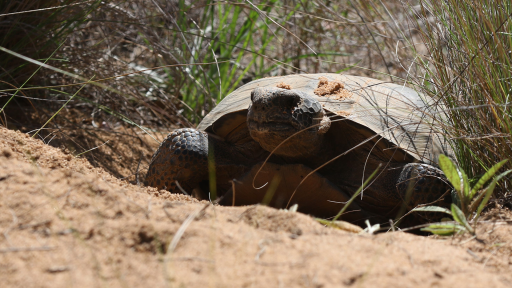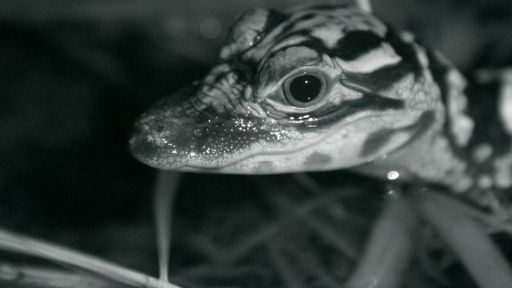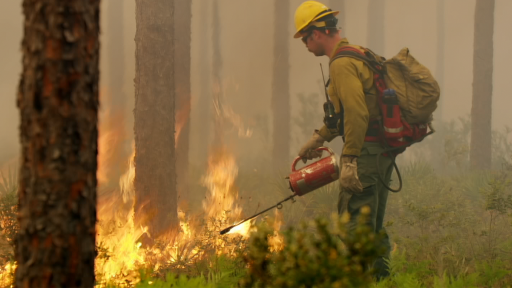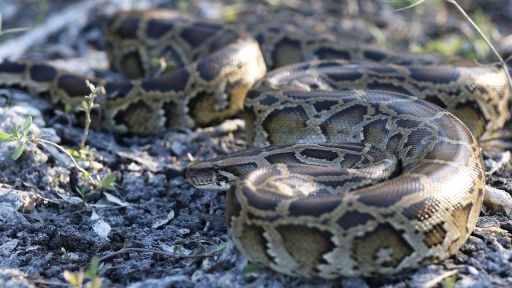Florida is well-known for its beaches, blue water and year-round sun, but it also has a surprising wild side. It is home to pine forests, coral reefs and the famous Everglades wetland, the largest subtropical wilderness in the United States. Here, manatees swim in crystal-clear rivers, baby alligators practice their hunting skills and miniature deer roam free. Every year, this state faces the full forces of nature: from wildfires to flooding to powerful hurricanes. Now, a growing human population, climate change and abandoned exotic pets – like the Burmese python which can eat alligators – are added threats to this wild paradise. With the help of pioneering scientists, can Florida’s ecosystems continue to weather the storm?
Noteworthy Facts:
- The Florida Everglades is the largest subtropical wilderness in the United States. With 1.5 million acres of wetland, the Everglades is home to hundreds of marshland species and thousands of visiting birds.
- In order to attract a mate, male alligators vibrate their larynx to let out deep growls. Low frequency sounds, inaudible to human hearing, make the water dance and can be heard over a mile away. Once a male successfully attracts a female, the mating can last for days before the couple goes their separate ways.
- Florida is home to 20 major rivers and 700 warm springs. The Silver River in Central Florida is one of the largest freshwater springs in the United States and is where Florida Manatees live during the winter. The river is so warm and shallow that algae blooms on the manatees’ backs. Once critically endangered, there are now more than 8,000 manatees thanks to recovery efforts.
- Florida experiences more direct hits by hurricanes than anywhere else in North America, and due to climate change, these hurricanes are more powerful than ever before. Hurricane Michael in 2018 was one of the most powerful storms to ever make landfall in Florida, with winds of 155 miles per hour.
Buzzworthy Moments:
- An ongoing threat to the native wildlife in Florida is the trend of abandoning exotic pets. There are now more than 500 non-native species living in the state, the most notorious of which is the Burmese python. Originally from the jungles and marshes of Southeast Asia, the pythons in the Everglades are now estimated to number more than 100,000 and have eaten around 98 percent of mammals in the area. Because of this crisis, licensed python hunting is now permitted in the Everglades year-round, where the hunters must carefully and humanely extricate them.
- Florida is the lightning capital of the United States. More than one million lightning bolts strike the state each year and just one can ignite the longleaf pine forest. However, these fires help clear the forest floor of unwanted scrub and allow new pines to germinate and grow without competition. But with the growing human population nearby, the lightning strike fires must be put out immediately. To keep longleaf forests alive, burns are now man-made and carefully managed by organizations like The Nature Conservancy.
- A female alligator watches over her babies after they’ve hatched. The babies, just eight inches long and defenseless, spend their days close together in groups called pods. Bright yellow stripes make them invisible among the dry grasses of the nest. When darkness falls, these hatchlings grow more courageous, breaking away from the pod and learning to hunt.
- The Florida Reef Tract in the Keys is the third largest barrier reef in the world and the only one in North America. Between strong hurricanes and human interaction, the corals have lost about 97 percent of their population. The Coral Restoration Foundation is leading the way in saving this reef through pioneering efforts. Growing thousands of corals in a nursery setting, the scientists harvest them when ready and then attach them directly onto the reef. More than 70,000 fragments have been planted in the past decade.

